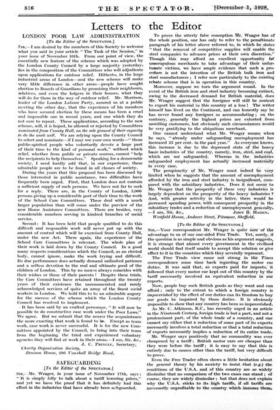SAFEGUARDING
. [To the Editor of the SPECTATOR.] SIR,--Mr. Weager, in your issue of November 17th, says : " It is simply folly to talk about a tariff lowering prices," and yet we have the proof that it has definitely had this effect in the industries that have already been safeguarded. To prove the utterly false conception Mr. Weager has of the whole position, one has only to refer to the penultimate paragraph of his letter above referred to, in which he states " that the removal of competitive supplies will enable the steel companies to advance prices at their own discretion.° Though this may afford an excellent opportunity, for unscrupulous merchants to take advantage of their , unfor- tunate victims, we have ample. evidence that such a pro- cedure is not the intention of the British bulk iron and steel manufacturers ; I refer now particularly to, the existing rebate scheme that is in operation in this country.
Moreover, suppose we turn the argument round. In the event of the British iron and steel industry becoming extinct, owing to the decreased, demand for British material, does Mr. Weager suggest that the foreigner will still be content to export his material to this country at a loss I _ The writer himself has lived on the Continent, and can honestly say he has never found any foreigner, so accommodating ; on the contrary, generally the highest prices are extorted from unwilling customers, but obviously such circumstances would be very gratifying to the ubiquitous merchant.
One cannot understand what Mr. Weager means when he says, " already under safeguarding unemployment has increased 25 per cent. in the past year." As everyone knows, this increase is, due to the depressed state of the heavy basic industries of the country, namely, iron,, steel, and coal, which are not safeguarded, Whereas in the industries safeguarded employment has actually increased materially in every case.
The perspicacity of Mr. Weager must indeed be very limited when he suggests that the amount of unemployment afforded by the iron and steel industry is insignificant, Com- pared with, the su6sidiary industries. boes it not occur to Mr. Weager that the prosperity of these very industries is
largely dependent on- the prosperity. of the heavy industries ? And, with greater activity in the latter, there would be increased spending power, with consequent ,prosperitY in the subsidiary trades and a reduction of unemployment generally.








































 Previous page
Previous page